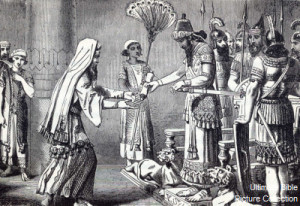Josephus, Against Apion I, 37-43: Authenticity of Scripture
The historian, Josephus, argues the authenticity of the Jewish tradition by referring to the antiquity, accuracy, and divine inspiration of the Jewish scriptures. In the process, he obliquely refers to all the books of the Bible. He also testifies to Jewish loyalty to their holy texts.
(37) …Everyone is not permitted of his own accord to be a writer, nor is there any disagreement in what is written; they being only prophets that have written the original and earliest accounts of things as they learned them from God himself by inspiration; and writing down what happened in their own times in a very exact manner also.
(38) For we do not have an innumerable multitude of books among us, disagreeing from and contradicting one another [as the Greeks have], but only twenty-two books, which contain the records of all the past times which are justly believed to be divine. (39) Five of them belong to Moses, which contain his laws and the traditions of the origin of mankind till his death. This interval of time was a little short of three thousand years. (40) But as to the time from the death of Moses till the reign of Artaxerxes, king of Persia, who reigned after Xerxes, 99 the prophets, who came after Moses, wrote down the history of their times in thirteen books. The remaining four books contain hymns to God and precepts for the conduct of human life. (41) Our history has been written since Artaxerxes very thoroughly, but it has not been considered of equal authority with the earlier records by our forefathers, because there has not been an exact succession of prophets since that time. (42) How firmly we have given credit to those books of our own nation is evident by what we do. For although so many ages have already passed, no one has been so bold as either to add anything to them, to take anything from them, or to make any change in them. But it becomes natural to all Jews, immediately and from their very birth, to regard those books as containing divine doctrines, and to abide by them, and, if need be, willingly to die for them.
(43) Our captives, many of them in number, and frequently in time, have been seen to endure torture and deaths of all kinds in the theaters so that they may not be forced to utter one word against our laws and the records that contain them.
99. Artaxerxes I succeeded Xerxes in 465 B.C.E. Josephus considered him to be the King Ahasueras of
the Book of Esther.




